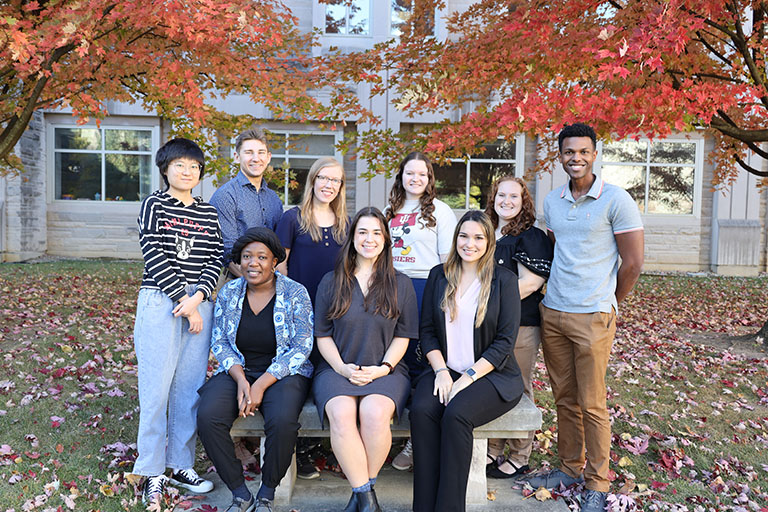As PBS seeks to diversify its own community, PBS graduate students also seek to diversify the body of graduate students entering the field as a whole. At the suggestion of Ph.D. student Tobi Abubakare, Director of Graduate Studies Karin James formally established a PBS connection to the NextGen Psych Scholars Program, an online mentorship program for underrepresented students interested in pursuing Ph.D.’s in psychological and brain sciences across the U.S. About twelve PBS graduate students have already signed on to serve as mentors and PBS chair Bill Hetrick has pledged to provide financial support for their work.
Begun in 2020 by two psychology Ph.D. students at the University of Minnesota, the program pairs graduate student mentors with current or recent undergraduate mentees of diverse identities and backgrounds, whether Black, indigenous, people of color, low-income, first-generation college, or LGBTQIA+. For each step in the process, mentors help spell out expectations that aren’t always apparent if you aren’t already part of the scientific or academic culture: from choosing programs to writing application essays, finding and applying for fellowships, transitioning to graduate school, or what to do if you aren’t accepted.
Abubakare began graduate studies at PBS in 2021 to study autism and social cognition through an intersectional lens and is a researcher in the Social Brain Lab of Professor Dan Kennedy and co-advised by Professor Kurt Hugenberg. Before coming to IU, they were a mentee in the program, while working as a post-baccalaureate fellow in a psychology lab in Boston. Now they are a mentor in the program. A child of Nigerian immigrants, who migrated to Houston at the age of two, Abubakare knows firsthand “the many surprises” you encounter if you are not already connected to the academic world, from the kind of vocabulary to use in a research statement to the fee waiver you can get on your application to graduate school. “Academia can be a hazy place,” they observe, “and if you weren’t born into the system, you wouldn’t know these things. My parents still can’t understand the language I use to communicate.”
Likewise, for Giulia Borriello, a postdoctoral student in the Learning, Education and Development Lab of Professor Emily Fyfe, who sees all too clearly that academia can be “a black box” for those not part of the social networks that convey information about the field and its culture. “I’ve always noticed the disparity between people who have somebody they know in the research world and those who don’t. So, if there are people interested in research, I want to be able to help them.” As an undergraduate at Penn State, she herself did not know anything about the research world until she happened to take a class in which the professor helped her get into a lab at NYU for the summer. She then stayed at Penn State for graduate school as a student in that same professor’s lab. If not for this experience, she says, “I don’t know what I’d be doing right now. And other people have a lot more barriers to getting this information than I did.”
As Abubakare suggests, students with certain identities are often not seen as future academics and consequently, are not readily provided with the information necessary for graduate schools. They might therefore not know anything about fellowships, for example, what they are and how to apply for them. Abubakare’s commitment to helping a diverse group of students navigate academia, comes out of a conviction that “academia shouldn’t be focused on one type of student, but rather should allow other voices, other experiences, other backgrounds to be part of it.
“We should do as much as we can,” they say, “to break down these barriers to enable more students to become part of this community, and to pursue research and scholarship that will hopefully better the world.”
PBS has been steadily taking on new initiatives to make its own graduate student community more diverse, such as dropping the GRE requirement for admission, participating in conferences that target Black and Latinx students, and reaching out to historically Black colleges and universities. And as James reports, we have made great strides. “Our incoming class is a lot more diverse than it ever was.” But there is more improvement to be made, she adds, and at all stages of the scientific process: “Diversity affects science across the board. The more voices, and the more people from different backgrounds, the better the quality of the science.”
To find out more about DEI initiatives in PBS, go to the link below.

Seated (L to R): Tobi Abubakare, Gabrielle Shimko, Marianne Chirica
Standing (L to R): Tongyao Zhang, Jack Buss, Sarah Cutts, Hellen Kyler, Allison Green, Robinson De Jesús-Romero
Not pictured: Allison Peipert, Rebecca Bove, José Chimelis-Santiago, Yiyan Tan, J Wolny, Giulia Borriello, Isabella Starvaggi Photo by Jordan Morning
 The College of Arts
The College of Arts